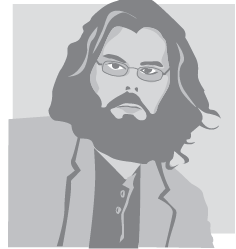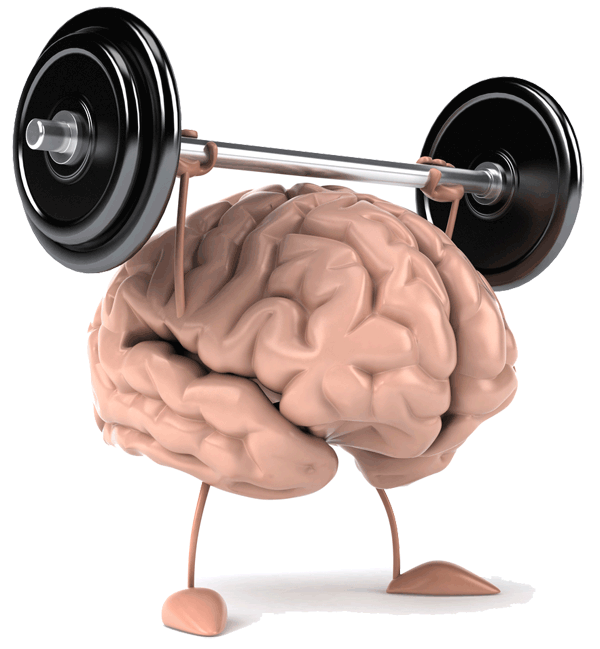aNewDomain — Your brain can only manage a certain amount of work. And it only has the parts it needs to accomplish the demands upon it.
— Your brain can only manage a certain amount of work. And it only has the parts it needs to accomplish the demands upon it.
It’s such a marvelous piece of engineering for something developed essentially at random. The power of evolution: variation plus environment equals adaptation. Think about it.
When someone loses the use of their eyes, the area of the brain responsible for vision remains intact. And it continues to do work.
Absent visual signals to process, it begins to process other types of sensory information. The result can be someone who sees using their ears. Look at this:
Sometimes, people like me get what I call Asperger’s consolation prizes. One of them is what Dr. Darold Treffert calls savant abilities.
 Savant wise, I never got anything terribly spectacular. I always knew the time. I never had to study. I could do relativity in my head without understanding the math. Rhythms, patterns were mine.
Savant wise, I never got anything terribly spectacular. I always knew the time. I never had to study. I could do relativity in my head without understanding the math. Rhythms, patterns were mine.
Now, not so much.
What changed? Everything.
I started to notice in graduate school that my mind was changing. Things were different then. I had a family started. I’d been married for a few years by then but really only had to keep track of one relationship.
I had a job but it was hardly demanding or mentally taxing. But suddenly I had many friends – graduate school was the first time I remember being valued for my intellect rather than devalued for it.
And the work became very difficult. I had to read piles of texts every week, find time to work 50 hours, attend classes and get clinic duty done – all while learning how to raise a newborn son. It was really clinic duty and therapy that did it, though.
I had to learn empathy.

Previously, I had all the brain necessary for empathy. However, that brain was not in use at the time. Thanks to autism, isolation and alienation had rendered my faculty of other-sight useless.
Without others to see and care about, that brain went to work on other tasks.
Useless things, such as memorizing all the dialogue of Star Wars, keeping track of the passage of every second, understanding that objects accelerating gain mass and therefore cannot attain light speed – it would take infinite energy. But we don’t have infinite energy. And I don’t, for sure.
And, as I learned empathy – by being in therapy and by being a therapist myself – my brain had to adapt.
 It let go of useless tasks in order to focus on useful ones.
It let go of useless tasks in order to focus on useful ones.
When we take savants out of their familiar environments, we tend to find their abilities decline.
A person who previously only stayed home and practiced their skill because they had nothing else to do suddenly finds they have to adjust to supported employment, to new relationships, to the living skills we are teaching.
To new places and people.
Not only are there new and important demands on their brains, but they no longer have ten or twelve or sixteen hours a day to practice their narrow skills. So natural musicians become less musical. Natural mathematicians become less math-y.
Dr. Treffert tends to disagree, and that’s fine. We have different data sets. I have what happened to me, and what happened to my clients of disability.
One man, let’s call him Wallace but that’s not his name …
Wallace could memorize telephone directories. Sometimes he’d call me because he’d seen my number one time and never forgot it. He remembered everyone’s birthday and could do calendar calculations.

But that was before we got him a job. That was before we taught him social skills, how to ride the bus, helped him develop a routine and keep track of a schedule and how to make breakfast. How to write a meal plan. How to dress himself, use a toothbrush effectively, do his laundry.
Not many of us get these consolation prizes, so data really as a matter of fact is this scarce. A case here, a case there. We can’t investigate these consolation prizes of autism and their comings and goings in the same way we do drug trials, to the tune of 100,000 participants over 10 years.
Dr. Treffert estimates there might be 50 or so living savants.
I was never really spectacular enough to be counted among them and have lost what I ever had. Walter lost his, too, for the same reasons.
I don’t miss it.
If you wonder, I don’t miss it. The things I could do were and are useless. Maybe if they’d been nurtured I could have been a particle physicist or something. But would I have ever learned to love other people?
I had this freaky experience once. On the way back from China, following two weeks of intense meditation on the nature of mind and relationship, intense and sudden interpersonal relationships. I’d just met 500 people, all of whom were fantastic, authentic, wondrous.
And in the airport, I experienced either a psychotic break or a feeling of pure and untainted love, of agape, love for people in the abstract. It was amazing, a peak experience. I don’t think I could have had that with my time-brain still connected, because it was using neurons my love-brain needed.
For aNewDomain, I’m Jason Dias.
Image one: ChicagoInternalCleansing.com, All Rights Reserved; image two: ScaryMommy.com, All Rights Reserved; image three: TechTimes.com, All Rights Reserved; image four: MyZeroWaste.com, All Rights Reserved.












